To mark International Day of Persons with Disabilities, Light for the World South Sudan’s Country Director, Sophia Mohammed, shares how their Disability Inclusion facilitators are travelling the length and breadth of the country with MAF to champion the rights of people living with disabilities.
Just a few weeks ago, Sophia Mohammed disembarked a MAF plane after a short trip to Maridi to launch a new teacher training programme. After embarking on a similar programme in Juba, new teachers in Maridi will get the chance to learn sign language and braille.
‘We flew with MAF to Maridi with representatives from the National Ministry of Education to launch a teacher training in braille and sign-language at the Maridi National Teachers Training Institute,” Sophia explains.
‘The training is an initiative of the Ministry of Education that we are supporting financially and technically. It is a nine-month course that will be rolled out every year to make sure all the preservice teachers will graduate with knowledge of Braille and sign language.’
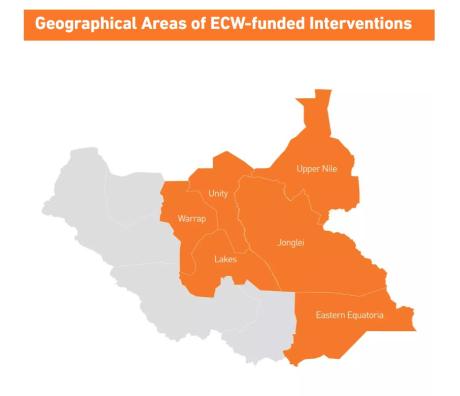
We focus a lot on policies and strategies of organisations because we want to make sure that inclusion of persons with disabilities is a requirement in their programming. People with disabilities have a right to access any sites without any limitation, and without any discrimination.
Achulube Stephen, Light for the World’s Programme Manager & Inclusive Education focal person, attended the launch and shares why training teachers is important.
‘Why do we train teachers braille and sign language? Because they are going to be teaching children and student with disabilities who need to learn. It is important that teachers are well prepared not only as teachers but also equipped with knowledge about disabilities so they can help their students.’
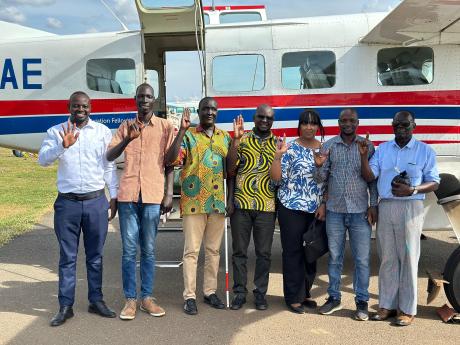
As MAF, we welcome the opportunity to fly for Light for the World. We value the important work you do championing the needs of persons with disabilities, helping to make South Sudan a more inclusive place
The training is just one initiative being delivered under the Education Cannot Wait campaign, a multi-year resilience programme launched in 2023 that aims to provide safe and inclusive education to 328,136 crisis-affected learners across fourteen counties in South Sudan and has so far reached 4,046 children with disabilities.
‘We have a project called Education Cannot Wait – to extend access education to every person in South Sudan – but particularly targeting persons with disabilities and girls.’ Achulube Stephen, explains.
‘In this programme we go from one part of the country to another – doing training, and conducting awareness, assessing the needs for disabled people, so they can go to school.’
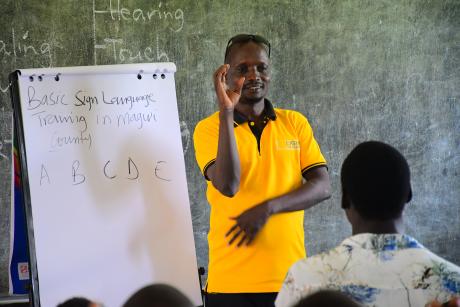
We prefer MAF, in most cases, based on the recommendations that we get from our team. They have an excellent experience of flying with MAF. They say they feel safe because of MAF’s positive attitude towards people with disabilities.
Sophia is excited about the reach of the ECW project and the team of enthusiastic advocates helping to deliver change.
‘We are working with 33 young people with different types of disabilities. Some of them are deaf. Some are blind. Some have a physical disability. These are our Disability Inclusion Facilitators,’ Sofia shares.
Senior Disability Inclusion Facilitator Peter Kamis, shares more about their work.
‘As a disability inclusion facilitator, our work in South Sudan is to create awareness about persons with disabilities and also to make sure that we make inclusion practical. We make sure that all the organisations that work in different fields are inclusive of the needs and requirements of persons with disability in terms of their programming and also their policies,’
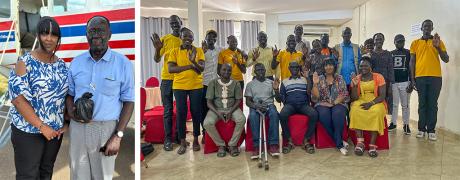
The first thing I noticed about MAF is that MAF flights start with a word of prayer. You know that when you are in the plane and flying in the air that you are covered by the power of God. That is great!
I see MAF going to Maridi and Mundri – but what about other destinations, because person with disabilities live all over the country?
‘Our Disability Facility Inclusion Facilitators regularly travel under the Education Cannot Wait programme to support some partners with trainings.’
‘We prefer MAF, in most cases, based on the recommendations that we get from our team, especially those ones with physical disabilities. They have an excellent experience of flying with MAF.
‘If they have a personal assistant, they always like to fly with MAF. They say they feel safe because of MAF’s positive attitude towards people with disabilities. That's the main reason that we really like to fly with MAF.
‘Accessibility is always an issue. But when it comes to MAF, they always say, you guys have patience. Even if there is no lift to take them up to the plane, they said you take time. You give them time to adjust themselves,’ Sophia says.
In 2023, South Sudan signed the UN convention on the Rights of Persons with disabilities. We want people to know that disability inclusion is a requirement not a request. It is mandatory for everyone - because it's a human rights issue.
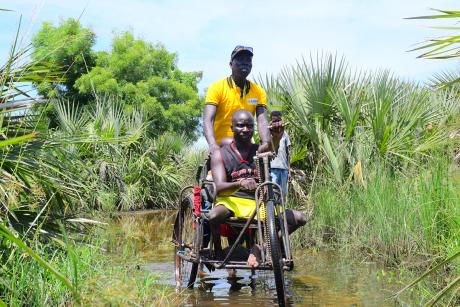
Sophia is a reluctant flier. ‘I don't like flying, but I feel safe with MAF. Flights are a necessity. Because of insecurity now our facilitators cannot go by road. MAF is helping us to reach the people we want to serve.
Sophia cites delays and travel disruptions they sometimes encounter with other airlines.
‘One time even our one of our blind facilitators, flew to Pibor. Changes in schedule meant that one time he had to stay there almost for one month. And by the time he came back, he was really frustrated,’ she explains.
MAF is competent. They are sure of taking care of their passengers, this one thing I have experienced. Another thing I have experienced is that they communicate with their passengers. The challenge for someone like me, when I enter into the plane, the pilot must communicate using sign language.
Sophia recalls one special request from a frequent MAF flier.
‘I remember one time, a Bishop from Yambio came to my office and showed me a photo of his son who has a severe physical disability.
‘I told him, ‘We don't have projects in Yambio. But we can give you a modified tricycle to help him move around - but we can't transport for you because it might be expensive.
‘His reply was, don’t worry! MAF will transport it for me! Just give me the device.
‘Later, Bishop Pene sent me the photo. When I saw that child smiling and moving around his compound with the tricycle, I said, wow, that’s really good! Such kinds of support you don't get it easily from commercial or even humanitarian flights.’
This collaboration with MAF and Light for the World is a great achievement – that we can work together to achieve our missions. I am happy that we can work together so we can do better in future.
Ensuring that disabled people have access to good services, requires good partnership working.
‘If you don’t hold hands, it’s very difficult to operate in South Sudan. The need is huge because these children are too many,’ Sophia explains
MAF is thankful for the feedback from facilitators that enables us to continuously improve our services to meet the needs of disabled passengers as well as encourage our staff.
MAF Partnership Development Manager Jaap de With has warm words to share.
‘As MAF, we welcome the opportunity to fly for Light for the World. We value the important work you do championing the needs of persons with disabilities, helping to make South Sudan a more inclusive place and better reflection of the Kingdom of God. We look forward to welcoming the team to the office to share your expertise on how we can make services more accessible. We hope we can continue to serve you well in South Sudan.’
Light for the World identified the need for Disability Facilitators in 2019 after realising that there is a wider gap between persons with disabilities and those without. We realised that most of the organisation in South Sudan are not inclusive so we brought persons of disability from different professions, persons of disability with different kinds of disabilities, and person of disability working in different activities. These people were trained in different models of disability inclusion, and they were tasked with building relationships with different partner organisations and government institutions to help screen their problems. Currently the Disability facilitators are many in number. We travel from one part of the country to another. We travel to access the needs of persons of disability in different States, that’s why we need access to MAF Services - because training is one key factor if you want services to remain inclusive.
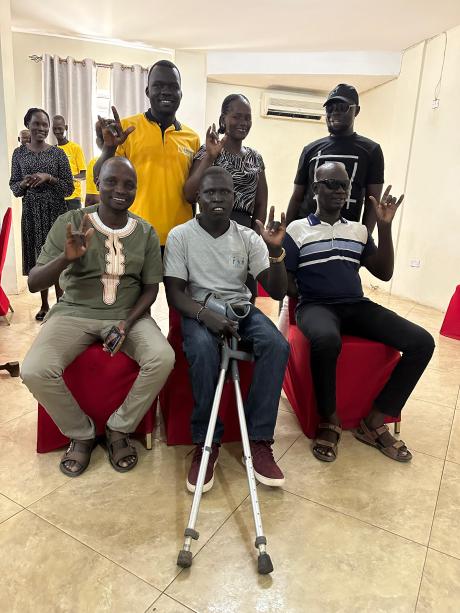
As a disability inclusion facilitator, our work in South Sudan is to create awareness about persons with disabilities. Also to make sure that we make inclusion practical. We have to make sure that all the organisations that work in different fields are inclusive of the needs and requirements of persons with disability in terms of their programming and also their policies.
We give technical advice on how they can include persons with disabilities in their programmes. We work with different partners, for example to Save the Children, to make sure when they do their different programmes, that inclusion is there – and also in term of access to information of the services they are delivering to the population.
We work with government institutions to make sure their programmes but also the physical environment is inclusive or accessible to persons with different types of impairment. We conduct disability audits at different facilities to ensure that people with different types of impairment can have access to different facilities. This is what we are doing as Disability inclusion facilitators.